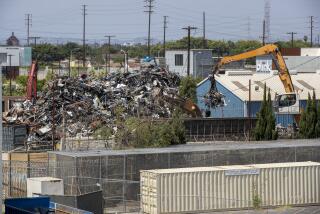Rebar Shortage Puts a Crimp on Building
Rebar is just a lowly scrap metal, but it’s starting to look like gold on some construction sites.
The steel reinforcing rods used in building everything from skyscrapers to freeway sound walls are in short supply on the West Coast. That has led to sporadic delays at building projects around California, including renovation work at the Hollywood Bowl and construction of a new engineering hall at USC. Rebar prices have soared 29%, from $175 a metric ton last year to $225 a metric ton today, according to a steel industry trade group.
“You can’t do it without rebar and that’s a bummer,” said Orla Jensen, USC’s construction manager. “We are calling the East Coast, overseas and south of the border to get it.”
The shortage is pushing up labor costs in some cases.
“We are having to make up for late deliveries of rebar with some overtime to get wall panels poured. We are right up against it,” said Dan Wozniak of Oltmans Construction Co., which is building a new warehouse for Mattel Corp. in San Bernardino. “This has never happened to us before.”
Industry officials say there are several culprits, including tariffs on steel imports imposed by the Bush administration last year, a pickup in construction and higher prices for scrap metal.
The West Coast is more dependent on imported steel than the rest of the country, and domestic steel producers here can’t keep pace with demand, suppliers say. China -- a top supplier -- is in the midst of its own building boom, further crimping availability.
“To my knowledge, all of these factors haven’t played into the mix before. There hasn’t been a situation like this,” said Steve Altman, a supervising engineer for the state Department of Transportation. “The steel industry has had other problems in the past, but this is the first significant shortfall that the department has faced in recent history.”
Caltrans is concerned the shortage could delay projects, including the new $2.6-billion San Francisco-Oakland Bay Bridge. Caltrans has sent letters to construction managers around the state, making some small allowances in rebar specifications.
The allowances do not include bridge columns, however, which must have the proper flexibility to bend and withstand earthquakes, Altman said.
The U.S. tariffs on imported steel reduced rebar imports to the U.S. by more than one-third through the first eight months of this year, according to the Commerce Department’s International Trade Administration. The World Trade Organization last week ruled the tariffs illegal and the European Union has threatened sanctions if they are not lifted by Dec. 15. The Bush administration has not disclosed its plans.
“The tariffs were put in place to help a supposedly ailing U.S. steel industry. But steel users in California are supplied by Asia and that is hurting construction,” said Gary Hufbauer, senior fellow at the Institute for International Economics.
Now that Republican Arnold Schwarzenegger is California’s governor, Hufbauer said, President Bush has an opening to allow a waiver on tariffs against steel imports to California.
“At this point, Bush has a decision to make. We suggest he revoke the tariffs and make steel users and foreign companies happy,” Hufbauer said. “It’s a natural for California to ask for total revocation or to ask for very broad exclusions from the tariff to allow steel to come in as it did before. That is almost a no-brainer for Bush to do, to ease things in California and the West.”
In the meantime, some suppliers of rebar are asking steel mills to provide letters that they can pass on to their customers explaining that they can’t get the rebar needed to complete a project.
“I’d like to shoot myself because of this,” said Lee Albright, general manager for J.L. Davidson Co.’s fabrication plant in Riverside. “Two to three weeks before the mill is ready to roll more rebar, we run out and can’t get it anywhere. They can’t pour the concrete at the construction site until all of the bar is there.”
Rebar, which looks as humble as it does rusty, is made from scrap metal. A bellwether grade of scrap known as heavy melt now sells for $150 a ton -- compared with $65 a ton in late 2001, said Paul Lowrey of Steel Base, a U.S. steel industry research and consulting firm.
“The price of scrap is going way up,” Lowrey said.
The few mills that produce rebar in the West include Cascade Steel Rolling Mills Inc. near Seattle and TAMCO Steel in Rancho Cucamonga, both of which said they have stepped up production to meet demand.
TAMCO, for example, has been running its mill on a round the clock, seven day a week schedule. Its employees have skipped holidays and the facility has postponed its usual weeklong maintenance shutdown.
“I know we are producing as much as we can. We are trying to make an additional 50,000 tons of rebar on top of the 500,000 we usually produce in a year,” said Chief Financial Officer Brad Wilkins. “As soon as we start rolling more, the trucks begin to line up outside waiting for us to finish. That’s very unusual.”
Fabricators like J.L. Davidson work rebar into pliant rods -- 60-foot lengths are generally used for commercial and public works projects -- and install it at construction sites. Other fabricators who say they are in short supply include Amber Steel Co. in Rialto, and Rebar Engineering Inc. and Franklin Reinforcing Steel Co., both in Santa Fe Springs.
At Franklin, the company normally has 2,000 tons of rebar in stock. Now that’s down to 600 to 800 tons, said Vice President Peter Rayfield.
“This is a crisis,” Rayfield said. “Everybody is short of steel. Something has to be done, and soon.”
More to Read
Inside the business of entertainment
The Wide Shot brings you news, analysis and insights on everything from streaming wars to production — and what it all means for the future.
You may occasionally receive promotional content from the Los Angeles Times.











